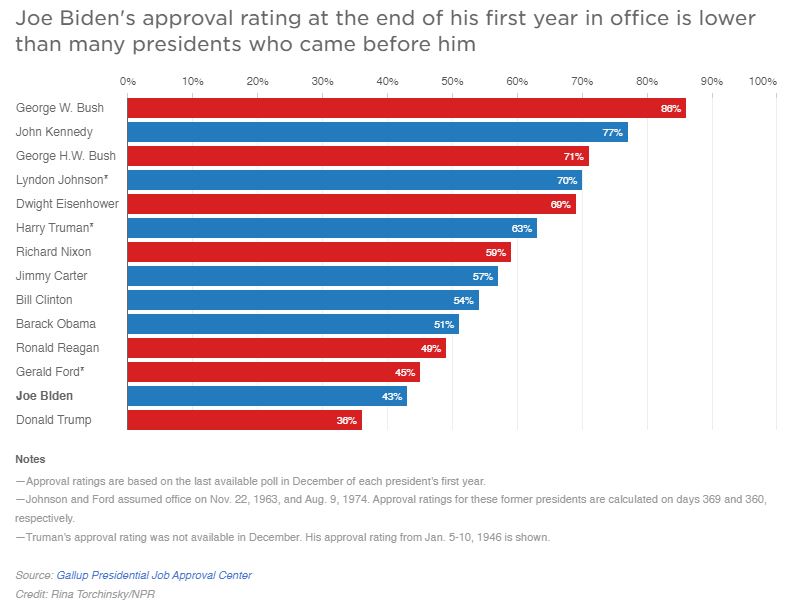News

6 questions for politics in 2022
By: Domenico Montanaro | NPR
Posted on:
WASHINGTON, D.C. (NPR) — From control of Congress and the strength of the Biden presidency to potential Jan. 6 committee revelations and the future of abortion rights, there’s a lot at stake in 2022.
We have lots of questions about what’s ahead. Here are six:
1. Can Biden turn it around?
President Biden ended 2021 with the lowest approval ratings of his presidency in the NPR/PBS NewsHour/Marist poll. The ongoing pandemic, rising inflation, the chaotic Afghanistan withdrawal and Democratic infighting over legislation hurt how people see his presidency.
In fact, Americans’ view of how Biden’s handling his job is historically bad. His approval rating at the end of his first year in office is the second worst of any president since World War II, according to Gallup. Of course, we’re now in a more polarized time, and politics isn’t static. Other presidents have hit lows and turned it around — Ronald Reagan was at 35% in 1983, and Barack Obama was at 40% in 2011, but both handily won reelection a year later.
Two things in particular need to improve for Biden to make a turnaround — the pandemic needs to lessen and price increases need to let up.
Toward the end of 2021, Biden made his strongest indication yet that he will run for reelection, but if the 79-year-old’s political fortunes don’t get better, there may be a furious effort to find a Democratic replacement.
2. Will we get back to any sense of normal?
The coronavirus has taken a big bite out of our sense of normalcy for nearly two years. Americans are understandably fatigued from yo-yo-ing restrictions, mask wearing and school shutdowns.
Even if necessary to protect public health, these measures have been emotionally taxing, especially after what looked like the chance to get back to some degree of normal last summer, only to be largely sidelined again because of the delta and omicron variants.
It’s taken a political toll for sure and exacerbated sharp political divisions. Anger and fear are incredible motivators to vote, but an incumbent needs to give people hope to have a chance to win reelection.
3. What, if anything, are Democrats able to pass?
Oh, hello again, Joe Manchin.

There’s a debate going on in Democratic circles over how to deal with Manchin and the party’s legislative agenda. Democrats have to decide whether to try for a further-scaled-down social safety net and climate bill, focusing on a few key parts, like universal pre-K, health care and climate, or to break the measure up into smaller pieces.
What’s more, there is growing pressure on Democratic leaders to address voting rights, which have been scaled back in many GOP-led states. That likely means exploring a carveout of some sort in the legislative filibuster. At any rate, the clock is ticking because Democrats are facing an uphill battle to retain the House.
4. Do Republicans take back control of Congress and, if so, what will they do?
As noted, Republicans are favored to take back the House. The Senate, which is currently 50-50, is also up for grabs, though Democrats appear to be in a better position for now in the upper chamber. But what are Republicans going to run on, and what would they do with that power should they win?
They have been criticized by some as being more the “party of no” than one interested in governing. When they were last in power, they passed budget-blowing tax cuts, but were unable to repeal the Affordable Care Act, which is growing more popular, because they had nothing to replace it with. Senate Republican leader Mitch McConnell played into the “party of no” narrative. Axios reports he is firmly against releasing any kind of legislative agenda ahead of the midterm elections.
Others, like House Republican leader Kevin McCarthy, disagree with that. He released a “Parents Bill of Rights,” a response to the debate over parental control of schools because of how America’s racial history is taught in classrooms. Does that continue to be a main issue, or will there be another outrage flavor of the season?
By the way, elections are right around the corner, with primaries beginning in March. Those primaries will also give us the first look at the power of former President Donald Trump’s wide-ranging endorsements.

5. What does the Jan. 6 select committee come up with — and when?
The congressional committee investigating the Jan. 6 insurrection will take a more public role this year with hearings and more potential revelations. It had issued dozens of subpoenas toward the end of last year, with some Trump allies willing and others less willing to participate. We will find out, for instance, if the Justice Department will file more contempt charges, like it did for former Trump strategist Steve Bannon.
The committee has gathered lots of information, interviewing some 300 witnesses, for example. It could start public hearings in the coming months, with a report expected ahead of the 2022 midterm elections. Committee members feel a sense of urgency to get its findings out because if Republicans win the House, they will in all probability shut down the investigation.
Their evidence and documentation of the siege will be key because Americans are as divided as ever. A new NPR/PBS NewsHour/Marist poll out Monday reveals that while 9 in 10 Democrats see what happened on Jan. 6 as an insurrection and a threat to democracy, just 1 in 10 Republicans do.
6. Does the Supreme Court severely curtail abortion rights?
In late 2021, the high court certainly looked like it was headed in that direction. Questioning from the court’s majority-conservative justices strongly indicated they were in favor of upholding restrictions in Mississippi, making it illegal to have an abortion later than 15 weeks.
Currently, abortions are legal up to about 24 weeks or the first two trimesters. That was a central holding in the landmark 1973 Roe v. Wade decision.
If the court does uphold the Mississippi law, it could open a floodgate of other restrictions in other states. The decision is expected this summer, just as the midterm elections will be heating up.
9(MDU1ODUxOTA3MDE2MDQwNjY2NjEyM2Q3ZA000))


